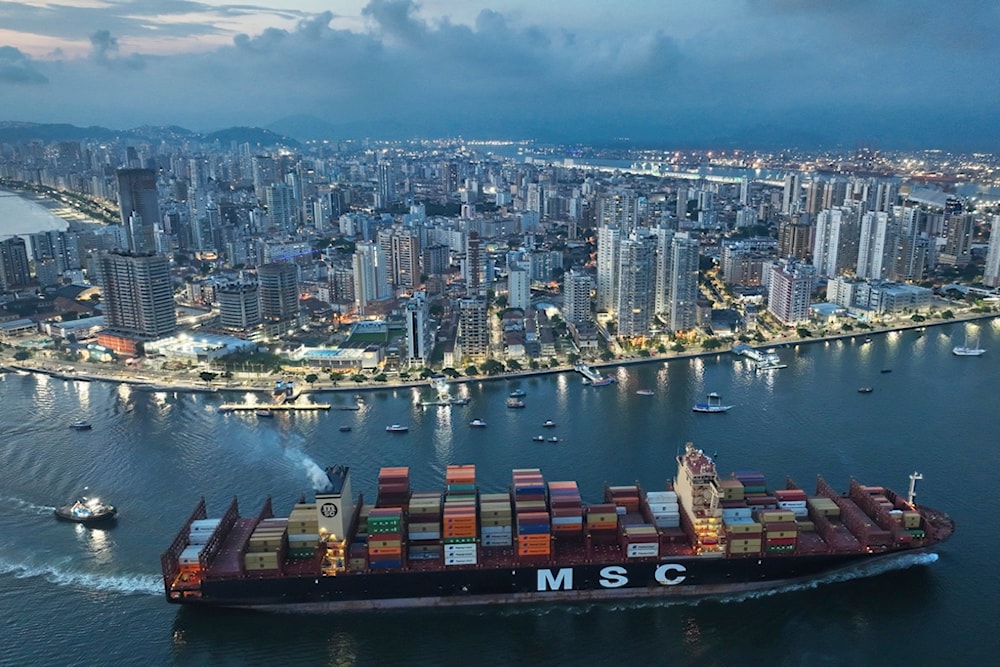Latin America turns to China as US tariffs spark uncertainty: Report
The China Daily on Thursday reported that escalating US tariffs are driving Latin American nations to reconsider their economic dependence on Washington, strengthen regional unity, and deepen trade ties with China amid rising uncertainty under Donald Trump's trade policies.
-

A container ship approaches the port of Santos in Brazil, Tuesday, April 1, 2025. (AP Photo/Andre Penner)
The China Daily on Thursday reported that growing US tariffs are prompting Latin American nations to reassess their economic ties with Washington and explore new trade strategies, particularly with China. The moves come amid fears that the United States' unpredictable trade policy—championed by Donald Trump—could destabilize international supply chains and undermine regional autonomy.
Welber Barral, Brazil's former foreign trade secretary, told China Daily that the US's latest tariff decisions could reshape relationships with key Latin American trading partners. "What's happening now isn't new. Trump has followed this approach for years," he said, warning that the full consequences of the measures remain unclear. "I don't think Trump fully understands the impacts on international trade – all the negative consequences.
The issue took center stage during the April 9 summit of the Community of Latin American and Caribbean States (CELAC) in Tegucigalpa. There, 11 heads of state denounced US tariffs and migration restrictions. Brazilian President Luiz Inácio Lula da Silva stated, "Trade wars have no winners," adding, "arbitrary tariffs destabilize the international economy and raise prices." He further warned that the region's "autonomy is in jeopardy" due to "attempts to restore former hegemonies."
Colombian President Gustavo Petro, the incoming CELAC chair, urged regional unity, saying, "We must decide whether we help each other or retreat into loneliness."
Barral stressed the vulnerability of exporters like Brazil, Argentina, and Peru. While noting that some Brazilian exports—such as oil, pharmaceuticals, and lumber—remain exempt under executive provisions, he highlighted the challenges faced by sectors like metals. "For this sector, we have a problem because 25 percent is too high," he said.
He suggested that increasing US tariffs would intensify pressure on Washington to reconsider its trade stance. "Are you going to create more pressure upon Trump to review the tariffs?" Meanwhile, he noted that exporters across the region are seeking new markets. "Everybody, especially those that export a lot to the United States, is going to look for alternatives."
Shifting Alliances
China is emerging as the most viable alternative. "China is investing in Latin America," Barral said, pointing to the fact that 21 of the region's 33 countries have joined the Belt and Road Initiative. China has also become the top trade partner for Brazil, Peru, and Chile. "China plays a significant role in Latin America," he added. "There's a lot of talk regarding the recent China-CELAC Forum."
Juan Carlos Baker, Mexico's former vice-minister of foreign trade, echoed these concerns. "The US tariff policy really is to rewrite the rules for international trade and to change the narrative," he said. "It's ironic that it was the US who helped build a rules-based global trade system, and now it's openly questioning its core principles."
Although Trump has suspended the tariffs for 90 days, Baker warned that the proposed 25% tariff on auto imports continues to threaten Mexico's major industries. "Mexico risks losing its relative advantage in key sectors like autos, steel, and electronics."
Baker concluded that while dialogue remains Mexico's priority, "retaliation is not off the table, it's just not the first tool we reach for."
Read more: Ecuador says open to US cooperation, ready to host US bases

 3 Min Read
3 Min Read









